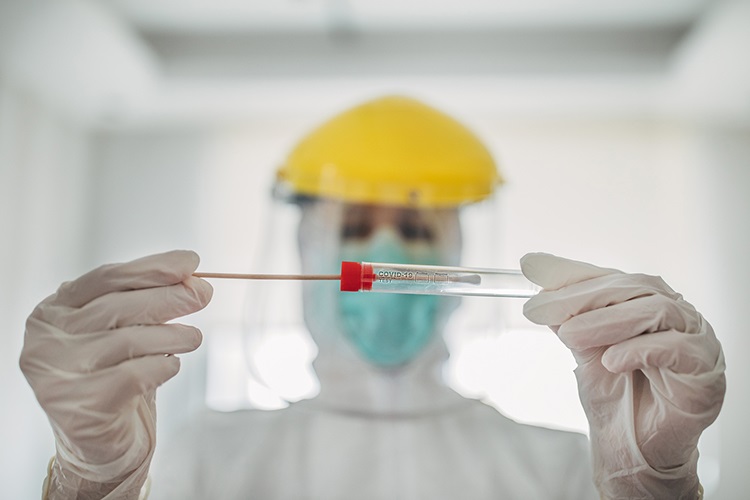Adjusting national COVID -19 testing strategy and scaling up testing capacity in Timor-Leste
Timor-Leste, an island nation of 1.3 million people, responded swiftly and effectively in dealing with the COVID-19 pandemic, despite a health care system with many system challenges and limited resources. Even before the first case was confirmed in the country, as immediate assistance, WHO prioritized ensuring availability of essential medical supplies and testing kits.
With confirmation of the delta variant in the community, it was anticipated that new cases would continue to rise, and the health system would become overburdened. It was therefore important to adapt the testing strategy to identify cases during the early infectious stage (<7days), when implementation of public health and social measures became stringent. In line with the above, Antigen Rapid Diagnostic Tests (Ag RDTs) played a key role in early identification and isolation of COVID-19 cases during high transmission periods. Thus, it was critical that scaling up of SARS-CoV-2 testing was linked to public health actions to ensure early diagnosis of cases for isolation, appropriate clinical care support and contact tracing to break chains of transmission.
Against this background, as a continuation of technical support, WHE SEARO organized a discussion with the country office to understand the current situation and develop recommendations to enhance current laboratory testing and expanding access to testing services in Timor-Leste.
Following are the key strategic interventions under several thematic areas recommended by the laboratory experts in the WHO’s Regional Office for South East Asia (SEARO).
Optimizing the Testing algorithm
- Prioritize the utilization of antigen rapid diagnostic tests (Ag RDT) and consider wider use of them for individuals in semi-closed settings.
- Undertake operational planning in this regard, especially after lifting public health and social measures (PHSM) including those for schools, workplaces, and prisons, in accordance with WHO guidance.
- Prioritize individuals for testing and include those meeting the suspected case definition for COVID-19, asymptomatic contacts, health care workers, those subject to testing during health facility screening, individuals who are at risk of developing severe disease, subsets of symptomatic individuals in a closed premise (e.g., long-term care facilities) in settings of suspected outbreaks.
- Use Ag RDTs for testing.
- Make efforts to incorporate testing strategies in Influenza Like illness (ILI)/Severe Acute Respiratory Infections (SARI) surveillance into the national COVID19 strategy; test all or a subset of samples collected from SARI/ acute respiratory infections (ARI)/ILI surveillance for SARS-CoV-2. Consider the use of multiplex kits to detect both influenza and SARS CoV-2 for this purpose.
- Expand the use of GeneXpert at the health facility for emergency testing and suspected cases enrolled through surveillance or clinical practice. It is advised to potentially use this platform to develop mobile testing centres, without affecting the provision of their current clinical services (e.g., Tuberculosis and Human Immunodeficiency Virus testing).
Expansion of access to testing
- Map other laboratories in the country, isolation centres and Ports of Entry (PoE)
- Plan for improving of specimen collection (including mobile sampling facilities) and referral mechanisms.
- Further, undertake the mapping exercise to identify case scenarios for use of Ag RDTs.
- Consider utilizing private facilities as well.
- Activate localized surge capacity by identifying human resources (HR), training for them and operational costs.
- Include medical/para-medical/nursing students (for specimen collection), laboratory staff from other fields such as academic laboratories, to backstop COVID-19 laboratory staff.
- Evaluate new and existing technologies through development of standard operating procedures and training. The evaluation of technologies including tests shall further determine placement or removal of tests from the national strategy.
- Consider international experts’ deployment to assist the cascade/Training of trainer’s trainings and establish mentorships to build in-country trainers on all aspects of laboratory management.
Operational recommendations to improve overall laboratory testing capacity, quality of testing, including biosafety and logistics aspects
- Implement and strengthen quality control management mechanisms and processes at national and decentralized testing sites
- Provide supervisory support to monitor proper sample collection
- Ensure optimal use of Ag RDTs.
- Consider setting up of a quality management cell that meets frequently to monitor implementation of quality control measures. This cell can be responsible for coordinating the networks of testing laboratories and providing all required support including troubleshooting.
- Develop a sampling strategy to monitor and track SARS CoV2 variants.
- Include the sequencing algorithm into the national testing strategy.
- Ensure wide dissemination and utilization of SARS-CoV-2 Antigen Rapid Diagnostic Test training package, including videos (also available in Portuguese language). Any translation to local language can be further supported by WHO.
- Review existing transportation system especially in hard-to-reach areas, with a view to identifying gaps and areas to improve logistics support.
- Develop an electronic platform to monitor sample transportation and sample quality to ensure less turnaround time.
- Establish a biosafety/bio-risk management cell/team led by the existing bio-safety officer. Offer periodic trainings, perform supervisory visits, address queries from the field staff on real-time basis.
- Under the bio safety and bio risk management, provide adequate visual aids to ensure awareness of all laboratory/allied staff personnel how to act in situations such as any incident of laboratory related exposure to infectious hazards.
- Consider forecasting the need for additional tests (PCR and RDTs and required supplies) and plan for mechanisms to have adequate supplies in place.
- Implement periodic and intelligent Genome Sequencing for variant monitoring while maintaining sample sharing with international reference laboratories.
The technical support and assistance from SEARO to WHO Country office for Timor-Leste and the Ministry of health is being provided on ongoing basis to help implement these context specific recommendations.

